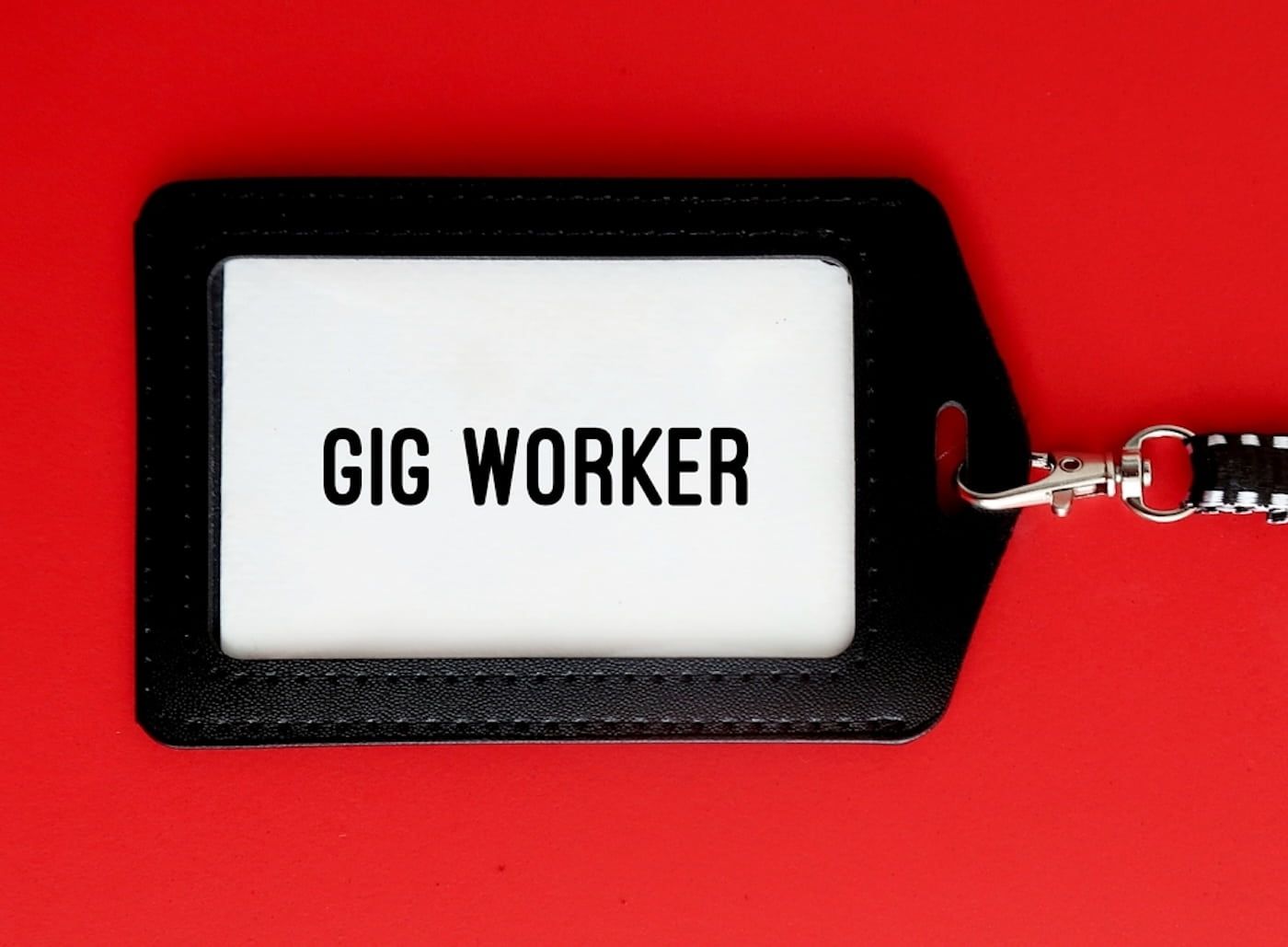Gig Worker Law: How To Protect Yourself In The Gig Economy (2024)
By Adrian Mole Updated: Feb 28, 2024

10 Steps you can take to determine your employment status.
There’s a difference between independent contractors (ICs) or gig workers and traditional employees regarding the law, as there are fewer protections and benefits.
Whereas employees enjoy a minimum wage, overtime pay, and unemployment insurance, gig workers don’t – there’s also no workers' compensation insurance or paid family leave.
Currently, Assembly Bill 5 (AB5) offers gig workers various protections in the state of California, no matter where the parent company is located.
Gig Worker Law: How to Protect Yourself in the Gig Economy in 2024
In terms of AB5, all workers are presumed to be employees unless they fulfill certain criteria, of which there are over 50 categories.
Here are 10 steps that a gig worker in California and other states can take to protect themselves legally under California's AB5 gig-worker law:
Step 1: Understand Your Classification
In determining whether you are classified as an IC or an employee in California, you must follow the criteria laid out in AB5.
To do this, you must review your employment contract in light of the California Supreme Court ruling to establish employment status in terms of the “ABC Test.”
This test establishes whether you are an “Exempt Worker” based on the right-of-control test.
There are multiple employment classifications possible as a worker might be classified differently for federal tax purposes compared to California employment law requirements.
It is vital that employers follow AB5, as misclassifying workers can result in severe legal consequences, including various fines and penalties.
A further problem employers can face is that workers can bring their own lawsuits, including class actions, for misclassification.
Classification Criteria
The specifics of the ABC test include three prongs, A, B, and C, and it helps to understand the criteria for classifying workers under each.
There are various exemptions to AB5, with over 50 categories of workers describing the details of those exemptions in terms of the “Exempt Job Categories.”
A thorough understanding of your classification is crucial for you to be able to access your entitlements and other legal rights.
Regarding current labor legislation, independent contractors aren’t entitled to benefits like minimum wage, overtime pay, unemployment insurance, workers' compensation, and paid family leave.
Non-exempt workers must meet all three prongs of the ABC test to be classified as independent contractors in California.
Exempt workers, although not subject to the ABC test, must work free from the control and direction of their client to qualify as independent contractors.
Legal challenges, such as the Uber lawsuit and the approval of Proposition 22, have influenced the application of AB5, particularly in the gig economy.
To ensure you receive the appropriate benefits and protections mandated by California employment laws, follow Step 2 below.
Step 2: Know the ABC Test
You must peruse your contract and the conditions under which you work to fully understand the ABC test's three prongs.
Prong A – Control or Direction of the Work
This refers to the control or direction of the work that you do, in that you are not under the direct control of the company.
Not only must you be free from the hiring entity's control and direction, but you also must prove it, both contractually and in practice.
Factors considered include whether you can be fired at any time or what your payment structure consists of.
Further, the test requires you to be remunerated on an hourly or job-based system and whether you are provided with tools and a workplace.
An assessment is made as to whether the nature of the work is skilled or unskilled and whether it is a distinct occupation.
The act also provides for whether you receive detailed instructions on how to complete the tasks and the duration of work.
Both you and your client must have the same mutual understanding of the working relationship so that there is no question by either party.
Prong B – Outside Service
Gig workers' services must fall outside the usual course of the hiring entity's business operations, such as a restaurant hiring a plumber for repairs.
This satisfies Prong B because plumbing is outside the restaurant’s normal business and cannot be confused with the operations of a restaurant serving food.
Prong C – Independent Business or Trade
To fulfill Prong C, a gig worker must engage in an independently established trade, occupation, or business related to the work being performed.
Numerous factors can support this, including:
- Having a separate office
- Occupying a business location
- Maintaining an online business listing
- Owning the necessary equipment
- Employing assistants
- Having a financial investment and potential for loss
- Holding liability or workers' compensation insurance
- Servicing multiple clients simultaneously
- A fee or payment structure that is job-based
- Possession of business licenses
- Filing separate business tax returns
While understanding the ABC test is crucial for determining employment classification in California, it is not mandatory in other states.
The act clarifies that non-exempt workers must satisfy all three prongs to be classified as independent contractors.
It is also possible that gig workers may fall under a different employment category in terms of the IRS rules.
The Right-of-Control Assessment
The IRS employs a more adaptable "right-of-control" evaluation to ascertain the classification of workers as employees or independent contractors for federal tax considerations.
According to this examination, individuals are deemed employees if those overseeing their work possess the authority to guide and oversee their work.
This includes the overall outcomes of the task or project and the specifics of when, where, and how the tasks are executed.
A right-of-control assessment establishes whether a worker is classified as an employee or an IC in compliance with the Affordable Care Act (ACA).
The ACA mandates that employers with a workforce that exceeds 50 full-time employees extend health insurance coverage to all of them.
Step 3: Check for Exemptions
Even if its headquarters is in another state or country, AB5 affects most businesses located in California, including the construction, trucking, and healthcare industries.
Other industries affected by this employment legislation include all professional services, most franchise operations, referral agencies, and marketing, among many others.
Here’s a list of some of the category exemptions in AB5:
- Accountants
- Doctors
- Lawyers
- Engineers
- Architects
- Investment advisors
- Securities brokers
- Direct sales personnel
- Commercial fishermen
- Graphic designers
- Cosmetologists
- Barbers
There are also a few other bills that affect California businesses concerning additional exemptions, including Assembly Bill 2257 (AB 2257).
From September 2020, the following additional job category exemptions apply:
Visual Arts and Media
- Fine artists
- Photographers
- Illustrators and newspaper cartoonists
- Editors
- Videographers
- Freelance writers
- Translators
- Content contributors
Media Production
- Producers
- Narrators
- Copy editors
Creative Services
- Advisors
- Cartographers
Insurance and Consulting
- Gig economy insurance underwriters
- Consulting services
Specialized Services
- Animal services
- Competition judges
- Landscape architects
- Home inspectors
- Real estate appraisers
Recent Proposition 22 Developments
An appeals court overturned the 2021 ruling declaring AB5 unconstitutional, and Uber, Lyft, Instacart, and DoorDash can classify their workers as independent contractors.
The law was a source of controversy among gig workers, and Prop 22 was passed to provide protections such as health insurance and minimum hourly pay.
The fight isn’t over, and the Service Employees International Union and drivers are likely to appeal the decision, taking it to the California Supreme Court.
Step 4: Evaluate Control and Direction:
The purpose of AB-5 is to clarify the criteria required to determine whether a person providing labor or services is an employee or independent contractor.
To be considered an IC, gig workers must meet the three conditions outlined in Section 2750.3(a)(1):
- Freedom from control and direction
- Performance of work outside the usual course of the hiring entity's business
- Engagement in an independently established trade or business
Certain occupations are exempt from the ABC test and are governed by the Borello test, an alternative method for determining employee or IC status.
Occupations governed by the Borello test include licensed professionals, certain regulated service providers, and commercial fishermen.
The Borello Test
The Borello test considers multiple factors to assess the nature of the working relationship, with one of the key elements being the degree of control.
The amount of control the employer has over gig workers' activities, including the right to control the details of the work performed, is key.
The work must be carried out without interference from the biggest gig economy companies, with payment provided for completed tasks once the job is finished.
Whether the employer has the right to discharge the worker at will, without cause, is another factor that determines whether an employee/employer relationship exists.
Gig economy companies cannot just discharge a gig worker contracted to perform a task without being subject to the terms of their contract.
Providing Tools and Equipment
If the employer provides tools, equipment, or a workplace for the worker, then a case can be made for an employer/employee relationship.
Should the gig worker invest in facilities or equipment used in performing the best gig economy jobs, there’s less likelihood of being an employee.
Whether the worker has the opportunity for profit or loss depends on their managerial skill and is not a factor in an employee’s relationship.
If the gig worker has special skills required to complete the job that the hiring entity doesn’t possess, then they are less likely to control how the job is completed.
This is another key factor in determining whether the gig worker operates as an IC instead of an employee.
The services' duration and payment method (by the job or the hour) are further indications of an independent contractor.
Providing a Flexible Approach
The Borello test provides a more flexible approach compared to the ABC test, allowing for a nuanced evaluation of the employment relationship.
It is based on the specific circumstances surrounding the performance of the job and factors in the overall nature of the employment relationship.
A clear understanding of control helps you determine if you meet the requirements for being an independent contractor.
Step 5: Review Your Business Operations
The next step is to check whether your services are outside the scope of the hiring entity's usual business activities.
Prong B of the ABC test is concerned with establishing whether you provide similar services to your client’s main business operations.
If your work is distinct from the core business operations of the hiring entity, then you are classified as an independent contractor and not an employee.
Step 6: Establish an Independent Business
To determine whether you are providing an independent service, it helps to register a business entity to cover your services.
This will help to qualify you as an independent service provider by fulfilling the requirements of Prong C of the ABC test.
Having an independent business substantially strengthens your case for being classified as an independent contractor in the state of California.
Step 7: Maintain Documentation
To bolster your case, you’ll need to keep detailed records, including legal contracts, client invoices, and any other business-related documents.
Your accountant or bookkeeper can organize these documents into a secure digital file in your accounting software or a physical file for ease of access.
A professional accountant can offer various accounting tips and advice to help ensure that you meet the state's minimum requirements.
This documentation will prove crucial in the case of disputes or audits to demonstrate the nature of your working relationship.
Step 8: Stay Informed on Wage and Hour Laws
Each state has its own specific labor legislation, so you should know your state's minimum wage, overtime, and other labor laws.
If you are based in California or operate from there, regularly check updates from the California Department of Industrial Relations.
You must also stay current on the legislation governing wage and hour laws to ensure you receive the appropriate compensation and benefits.
Your accountant can advise you on the basic accounting principles that apply to your payroll and implement any measures you may require.
Step 9: Explore Multiple Classifications
You should also understand that you may have different classifications for different purposes in different states, affecting your tax and other legal status.
A qualified accountant or business advisor is best placed to know which tests apply for federal tax purposes and other regulations.
They can help you identify the multiple classifications under which you fall and help you comply with various legal requirements.
A qualified business advisor will also offer input on gig economy trends and how best to take advantage of them.
Step 10: Know Enforcement Mechanisms
As with all government rules and regulations, there are numerous potential consequences for misclassification, so it helps to know where you stand.
You should familiarize yourself with agencies like the California Labor Commission and the equivalent office in other states.
The California State Supreme Court and California Appeals Court clarified that the Fair Labor Standards Act can change how workers are classified.
Recent State Supreme Court and Appeals Court decisions provide proof that the days of gig companies playing "fast and loose" are over.
How the law will classify workers as independent contractors, provide for paid sick leave, and offer benefits like unemployment insurance is still up for debate.
But, knowing the enforcement mechanisms helps you take action if you've been misclassified and ensures you are aware of the current legal recourse available.
Summary
The recent decision by the California Supreme Court is a reminder that safeguarding worker rights is imperative within the evolving gig economy.
It’s up to all gig workers to stay informed of the changes in legislation and take the necessary steps to protect themselves within the law.
While legal challenges persist from the service employees' international union and others, it’s evident that gig workers will play a pivotal role in future legislation.
Adrian Mole is a UK-based Chartered Accountant and Chartered Tax Adviser. With a career spanning over 30 years, he has advised clients of all sizes on accounting, business, and tax matters and has a passion for helping startups. Formerly a partner of a Top Ten accounting firm in London, he now runs a small accounting practice closer to home with a committed team of finance professionals. A private pilot and keen scuba diver, when not working, he enjoys time with his family and teaching Ballroom dancing.
– Recommended Reads –
The information found on this website is for general purposes only and should not be considered financial advice. The Positive Accountant is an opinion and information based website only. Please do your own research and consult with a qualified professional before making any financial decisions.




